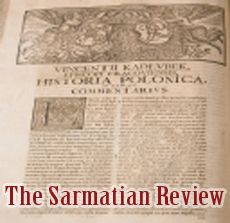| This Issue | Back Issues | Editorial Board | Contact Information |

American Betrayal: Franklin Roosevelt Casts Poland into Communist Captivity
Theresa Kurk McGinley
By Francis Casimir Kajencki. El Paso, TX: Southwest Polonia Press, 2007.xiv + 285 pages. Photographs, bibliography, index. ISBN 978-0-9627190-8-0. Hardcover.
Col. Kajencki (U.S. Army, retired) passed away on July 18, 2008, at the age of ninety. He was born in Erie, Pennsylvania in 1918, graduated from West Point Academy and became a commissioned second lieutenant. He served in the Pacific theater of the Second World War, and after retiring from the army wrote six books on American history including Thaddeus Kosciuszko: Military Engineer of the American Revolution (1998), and Casimir Pulaski: Cavalry Commander of the American Revolution. American Betrayal is his last book.
The book does not pull any punches. It clearly states from the onset the direction and moral perspective of the work. President Franklin Delano Roosevelt is accused of betraying Poland and casting her into a fifty-year sentence of communism. This fact remained an emotional subject for many thousands of Polish Americans since hope for a free and independent Poland was shattered after 1945. The argument presented is that the United States and England should have and could have acted to roll back the Soviet domination of Poland, but instead did nothing. The Second World War began in Poland, a fact that should have made patriotic Americans realize that Poland was a balance point between the free world and tyranny: if Poland fell, freedom would suffer worldwide. But even for more pragmatic reasons Poland could have expected Western loyalty. Despite having a government-in-exile, despite military leadership and successes on the battlefield, despite diplomacy, despite the principle of self-determination espoused by President Woodrow Wilson, the Poles remained trapped until 1989. Two opportunistic invaders, Hitler and Stalin, committed the geopolitical rape of an independent neighbor. Historians debate whether Roosevelt was actually naive in his dealings with Stalin, or whether, because of illness, he was physically and mentally unfit to make decisions at the important crossroads in Teheran and Yalta. Accounts of the massacre at Katyń under orders of the Soviet command and the coverup that followed should be required reading by any student of the Second World War. Soviet deception trumped allied idealism. Diplomacy sought to maintain a balance of power, but did not stand a chance against deception. Poland became a sacrifice of war.
The second half of the book focuses exclusively on the Katyń Forest Massacre, including documentation. It contains a chapter titled “U. S. Congress finds Russia guilty.” The suppression of information and the Nuremberg Court debacle are spelled out in great detail. A lengthy Appendice to the book is devoted to the erection of a National Katyń Memorial in Baltimore, Maryland, the details concerning that memorial, and biographical sketches of two Polish American military veterans directly involved in the war.
A book now needs to be written that focuses on how Poland managed to preserve its identity despite fifty years of communist oppression, and why it was Poland and not another country that was the first of the Soviet satellites to break free. Undoubtedly Pope John Paul II and the Catholic Church played a role, in defiance of those who try to convince the world that religion pushes people backward and not forward. In 1980 in the shipyards of Gdańsk Solidarity emerged despite the iron fist of the regime. The modern history of Poland can be seen as a remarkable story of victory, and new historical works should capture this perspective. Entrance into NATO would constitute the last chapter of such a book. On the other hand, the vaguely familiar bombastic beating of the chest by the Russian military against Poland inclines one to caution. What will be the response of the United States with a new president at the helm?
Back to the April 2009 Issue
The Sarmatian Review
sarmatia@rice.edu
Last updated 5/1/09